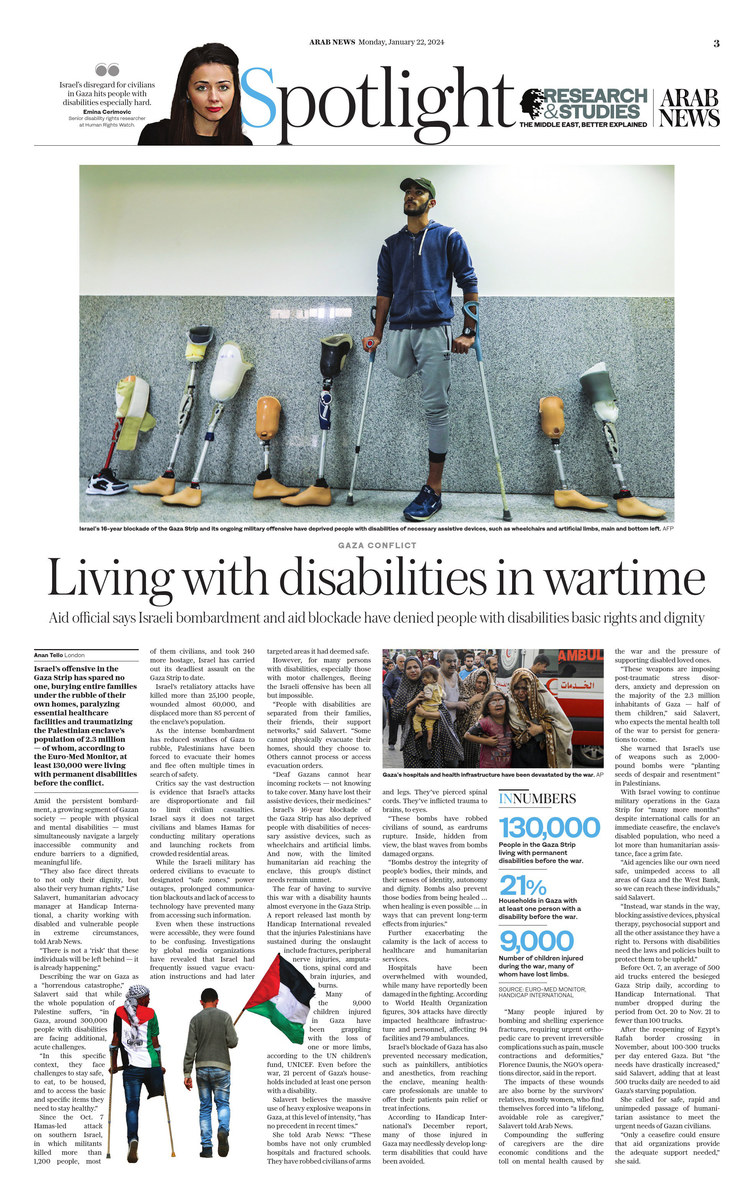LONDON: Israel’s offensive in the Gaza Strip has spared no one, burying entire families under the rubble of their own homes, paralyzing essential healthcare facilities and traumatizing the Palestinian enclave’s population of 2.3 million — of whom, according to the Euro-Med Monitor, at least 130,000 were living with permanent disabilities before the conflict.
Amid the persistent bombardment, a growing segment of Gazan society — people with physical and mental disabilities — must simultaneously navigate a largely inaccessible community and endure barriers to a dignified, meaningful life.
“They also face direct threats to not only their dignity, but also their very human rights,” Lise Salavert, humanitarian advocacy manager at Handicap International, a charity working with disabled and vulnerable people in extreme circumstances, told Arab News.
“There is not a ‘risk’ that these individuals will be left behind — it is already happening.”
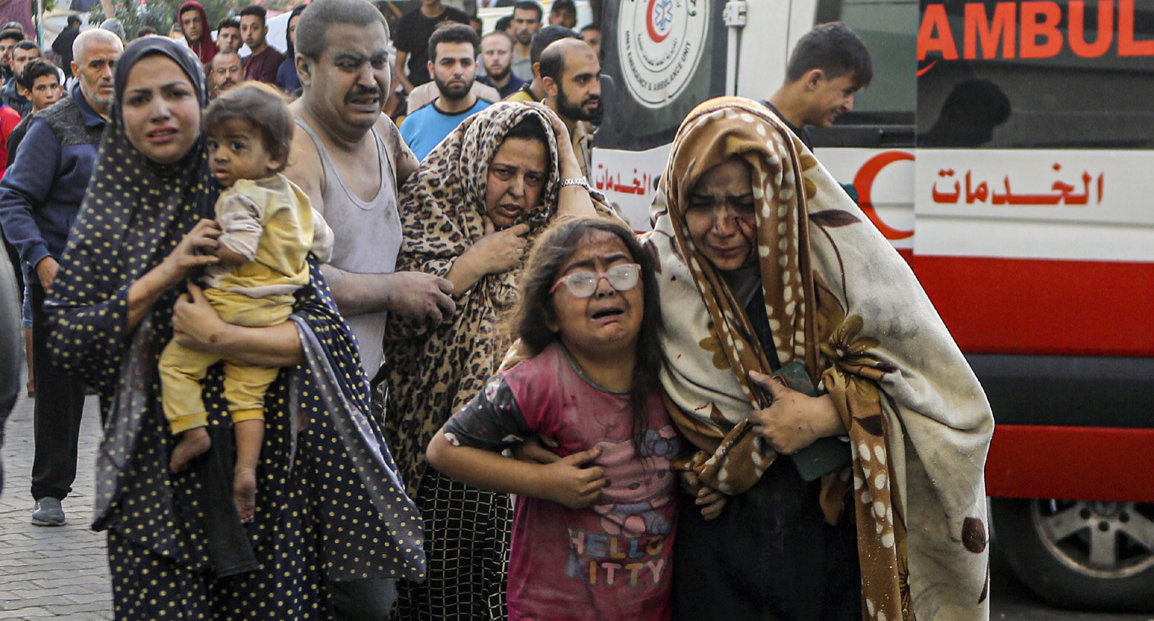
This photo shows injured Palestinians arriving at al-Shifa Hospital following Israeli airstrikes on Gaza City on Oct. 16, 2023. Gaza’s hospitals and health infrastructure have been devastated by the war. (AP/File)
Describing the war on Gaza as a “horrendous catastrophe,” Salavert said that while the whole population of Palestine suffers, “in Gaza, around 300,000 people with disabilities are facing additional, acute challenges.
“In this specific context, they face challenges to stay safe, to eat, to be housed, and to access the basic and specific items they need to stay healthy.”
Since the Oct. 7 Hamas-led attack on southern Israel, in which militants killed more than 1,200 people, most of them civilians, and took 240 more hostage, Israel has carried out its deadliest assault on the Gaza Strip to date.
Israel’s retaliatory attacks are reported to have killed so far more than 25,100 people, wounded another 60,000, and displaced more than 85 percent of the enclave’s population.
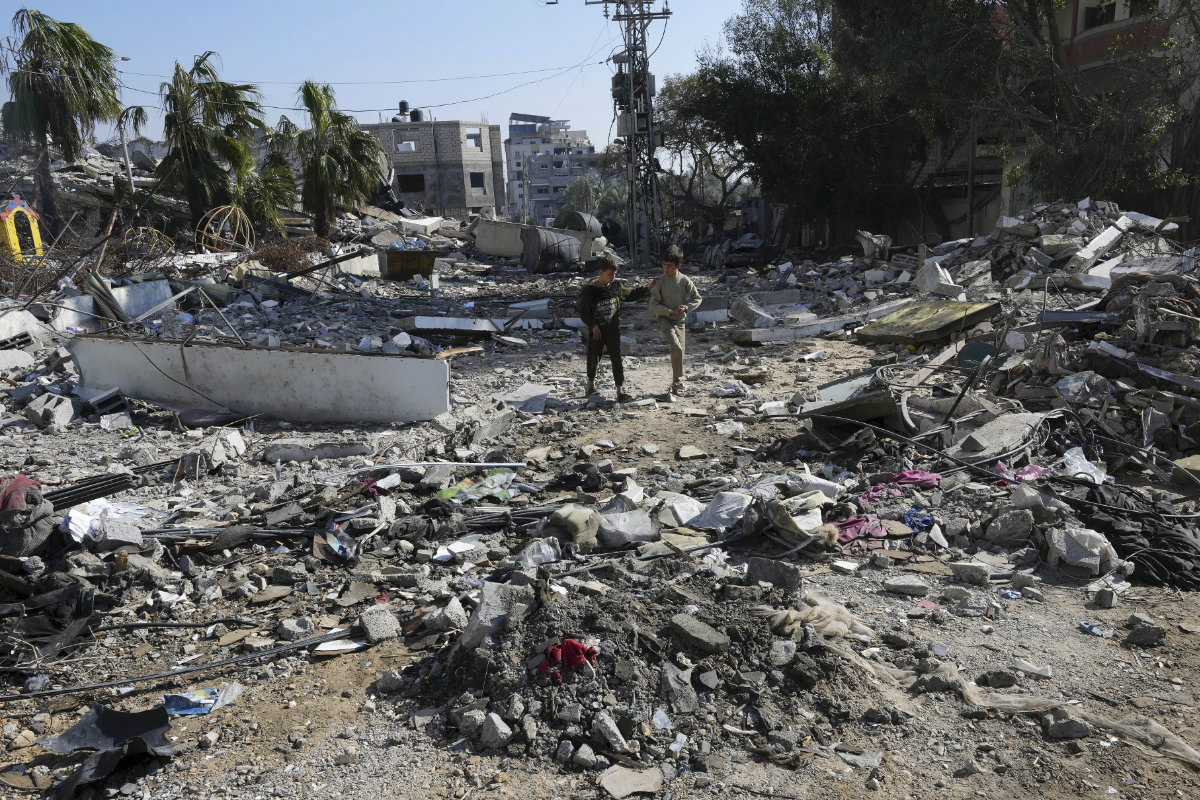
Palestinians walk through destruction from the Israeli bombardment in the Nusseirat refugee camp in Gaza Strip on Jan. 19, 2024. (AP)
As the intense bombardment has reduced swathes of Gaza to rubble, Palestinians have been forced to evacuate their homes and flee often multiple times in search of safety.
Critics say the vast destruction is evidence that Israel’s attacks are disproportionate and fail to limit civilian casualties. Israel says it does not target civilians and blames Hamas for conducting military operations and launching rockets from crowded residential areas.
While the Israeli military has ordered civilians to evacuate to designated “safe zones,” power outages, prolonged communication blackouts and lack of access to technology have prevented many from accessing such information.
Even when these instructions were accessible, they were found to be confusing. Investigations by global media organizations have revealed that Israel had frequently issued vague evacuation instructions and had later targeted areas it had deemed safe.
However, for many persons with disabilities, especially those with motor challenges, fleeing the Israeli offensive has been all but impossible.
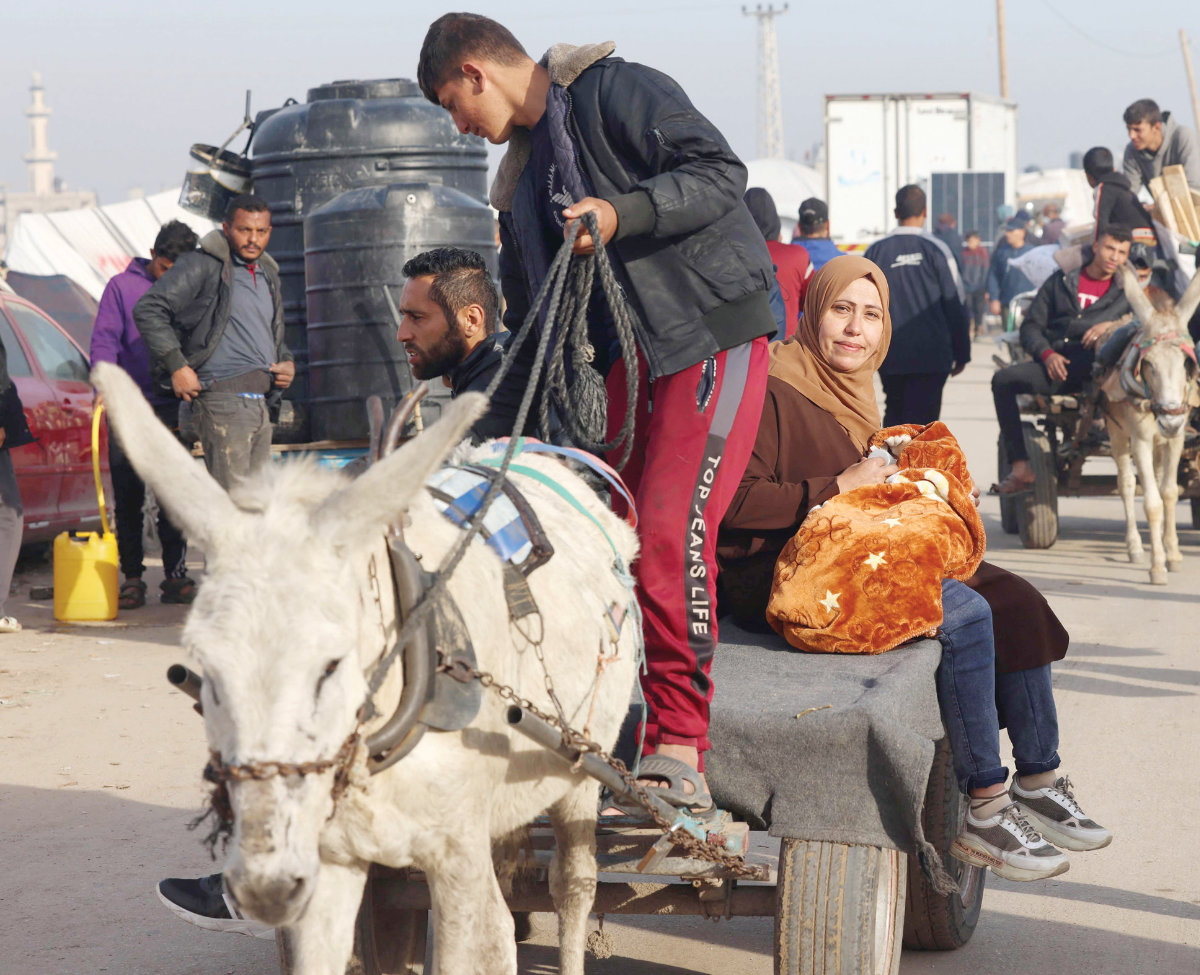
Displaced Palestinians move their belongings to a makeshift tent camp in Rafah near the border with Egypt in the southern Gaza Strip on Sunday. (AFP)
“People with disabilities are separated from their families. Their friends. Their support networks,” said Salavert. “Some cannot physically evacuate their homes, should they choose to. Others cannot process or access evacuation orders.
“Deaf Gazans cannot hear incoming rockets — not knowing to take cover. Many have lost their assistive devices, their medicines.”
Israel’s 16-year blockade of the Gaza Strip has also deprived people with disabilities of necessary assistive devices, such as wheelchairs and artificial limbs. And now, with the limited humanitarian aid reaching the enclave, this group’s distinct needs remain unmet.
INNUMBERS
• 130,000 People in the Gaza Strip living with permanent disabilities before the war.
• 21% Households in Gaza with at least one person with a disability before the war.
• 9,000 Number of children injured during the war, many of whom have lost limbs.
(Source: Euro-Med Monitor, Handicap International)
The fear of having to survive this war with a disability haunts almost everyone in the Gaza Strip. A report released last month by Handicap International revealed that the injuries Palestinians have sustained during the onslaught include fractures, peripheral nerve injuries, amputations, spinal cord and brain injuries, and burns.
Many of the 9,000 children injured in Gaza have been grappling with the loss of one or more limbs, according to the UN Children’s Fund, UNICEF. Even before the war, 21 percent of Gaza’s households included at least one person with a disability.
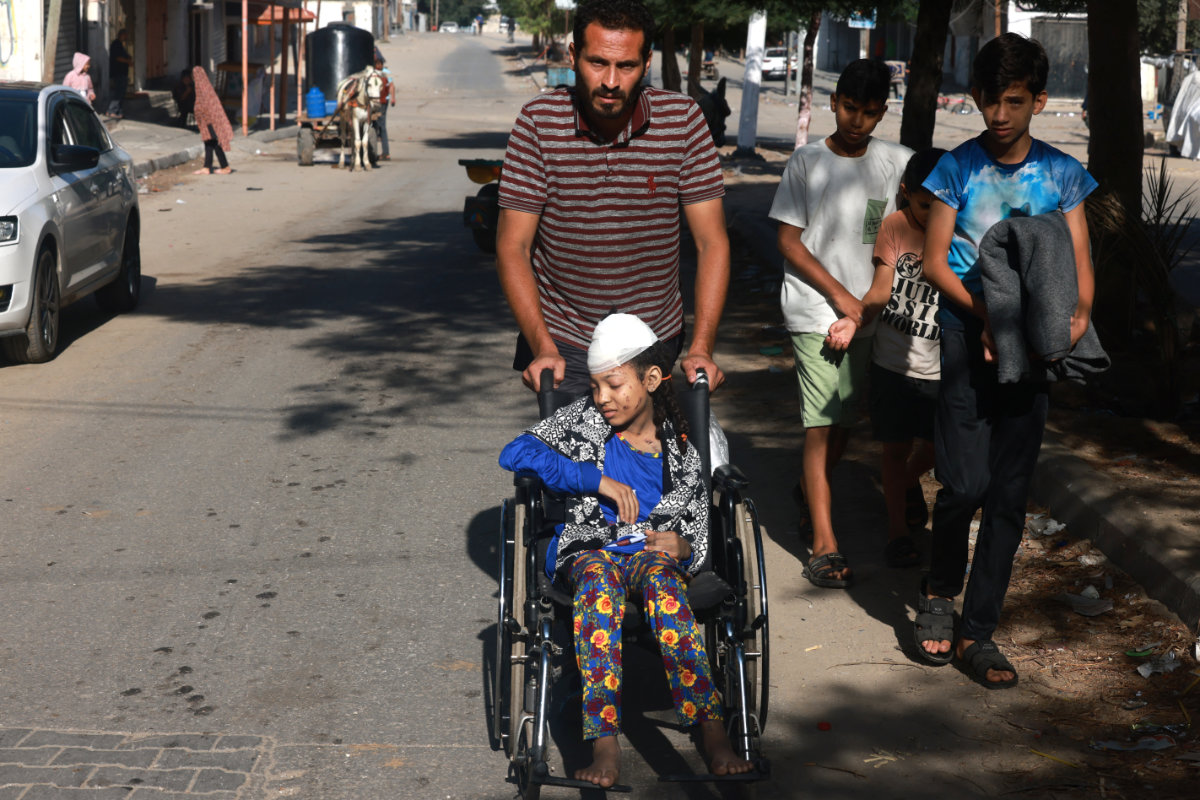
A wounded girl is transported on a wheelchair to a hospital in Rafah in the southern Gaza Strip on November 6, 2023. AFP)
Salavert believes the massive use of heavy explosive weapons in Gaza, at this level of intensity, “has no precedent in recent times.”
She told Arab News: “These bombs have not only crumbled hospitals and fractured schools. They have robbed civilians of arms and legs. They’ve pierced spinal cords. They’ve inflicted trauma to brains, to eyes.
“These bombs have robbed civilians of sound, as eardrums rupture. Inside, hidden from view, the blast waves from bombs damaged organs.
“Bombs destroy the integrity of people’s bodies, their minds, and their senses of identity, autonomy and dignity. Bombs also prevent those bodies from being healed … when healing is even possible … in ways that can prevent long-term effects from injuries.”
Further exacerbating the calamity is the lack of access to healthcare and humanitarian services.
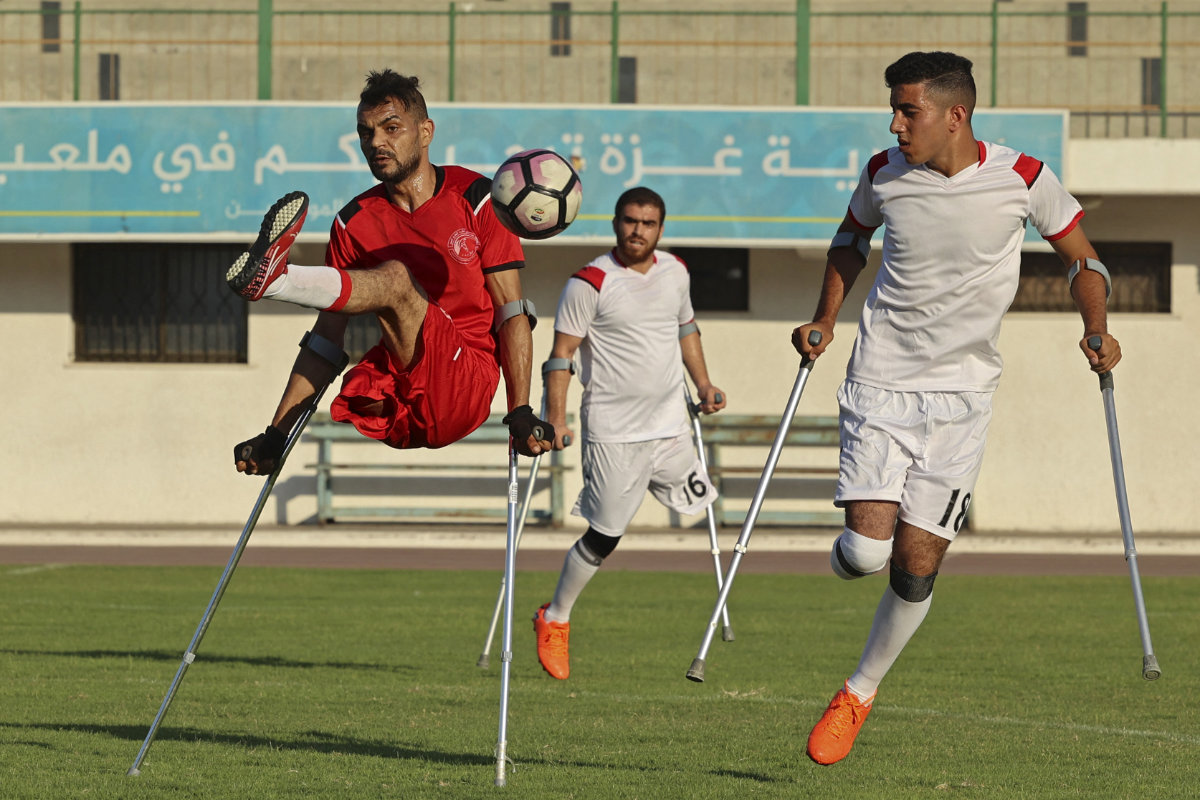
This photo taken on August 3, 2021, shows Palestinian amputee players compete during a football match at the Yarmouk Stadium in Gaza City on August 3, 2021. Israel’s 16-year blockade of the Gaza Strip and its ongoing military offensive have deprived people with disabilities of necessary assistive devices, such as wheelchairs and artificial limbs. (AFP)
Hospitals have been overwhelmed with wounded, while many have reportedly been damaged in the fighting. According to World Health Organization figures, 304 attacks have directly impacted healthcare infrastructure and personnel, affecting 94 facilities and 79 ambulances.
Israel’s blockade of Gaza has also prevented necessary medication, such as painkillers, antibiotics and anesthetics, from reaching the enclave, meaning healthcare professionals are unable to offer their patients pain relief or treat infections.
According to Handicap International’s December report, many of those injured in Gaza may needlessly develop long-term disabilities that could have been avoided.
“Many people injured by bombing and shelling experience fractures, requiring urgent orthopedic care to prevent irreversible complications such as pain, muscle contractions and deformities,” Florence Daunis, the NGO’s operations director, said in the report.
The impacts of these wounds are also borne by the survivors’ relatives, mostly women, who find themselves forced into “a lifelong, avoidable role as caregiver,” Salavert told Arab News.

A Palestinian woman watches over her 14-year-old daughter Lama Al-Agha at the Nasser hospital in Khan Yunis, southern Gaza Strip, on October 31, 2023, where she is being treated for injuries arising from an Israeli strike. Lama's sister Sarah is in an adjacent bed not shown in the photo, were wounded in an October 12 strike that killed Sara's twin Sama and brother Yahya, 12, says their mother, sat between the two hospital beds. (AFP)
Compounding the suffering of caregivers are the dire economic conditions and the toll on mental health caused by the war and the pressure of supporting disabled loved ones.
“These weapons are imposing post-traumatic stress disorders, anxiety and depression on the majority of the 2.3 million inhabitants of Gaza — half of them children,” said Salavert, who expects the mental health toll of the war to persist for generations to come.
She warned that Israel’s use of weapons such as 2,000-pound bombs were “planting seeds of despair and resentment” in Palestinians.
With Israel vowing to continue military operations in the Gaza Strip for “many more months” despite international calls for an immediate ceasefire, the enclave’s disabled population, who need a lot more than humanitarian assistance, face a grim fate.
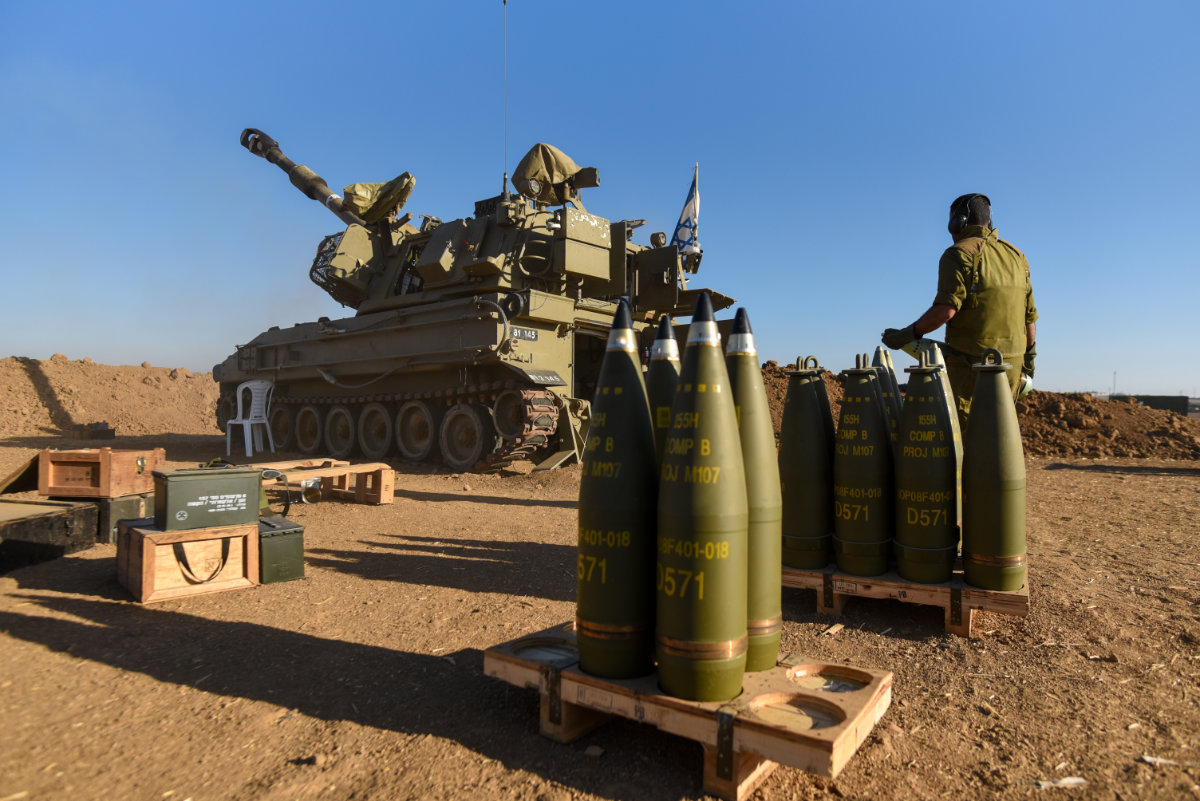
An Israeli M109 howitzer artillery cannon fires 155mm shells at Gaza Strip as it continues its offensive against Hamas militants. Unfortunately, it is the civilians who suffer from the bombardment. (Shutterstock photo)
“Aid agencies like our own need safe, unimpeded access to all areas of Gaza and the West Bank, so we can reach these individuals,” said Salavert.
“Instead, war stands in the way, blocking assistive devices, physical therapy, psychosocial support and all the other assistance they have a right to. Persons with disabilities need the laws and policies built to protect them to be upheld.”
Before Oct. 7, an average of 500 aid trucks entered the besieged Gaza Strip daily, according to Handicap International. That number dropped during the period from Oct. 20 to Nov. 21 to fewer than 100 trucks.
After the reopening of Egypt’s Rafah border crossing in November, about 100-300 trucks per day entered Gaza. But “the needs have drastically increased,” said Salavert, adding that at least 500 trucks daily are needed to aid Gaza’s starving population.
Humanitarian organizations, including the World Food Programme, have warned of famine across Gaza if adequate aid is not restored.
Salavert called for safe, rapid and unimpeded passage of humanitarian assistance to meet the urgent needs of Gazan civilians, adding that aid should be allowed through all border crossings to ensure relief for the whole territory.
“Only a ceasefire could ensure that aid organizations provide the adequate support needed,” she said.
